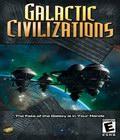Publisher: Strategy First
Developer: Stardock
Release Date: March 24, 2003
There are many ships in the game, each suited towards exploring, combat, and colonization. To colonize planets or stars you load the ship up with people from a planet, fly it to an uninhabited planet, and land. Different planets have different levels of quality and resources, so it is best to colonize the good planets quickly before the AI (OR human via the online play) players get to. Once you find a good planet and tell the colony ship to colonize the ship lands and creates a small outpost on the planet. Once colonized, you can use planets to build ships and you can upgrade the planet by improving the soil, building entertainment centers, developing trade goods, and many other things.
Combat in the game is relatively simple. Each ship has a certain amount of HP, offense, and defense points. When attacking a ship, the attacker rolls a number between its maximum offense points and 0. The defending ship then rolls a number between its maximum defense points and 0. If the attackers number is larger than the defenders number the difference between the two numbers is how much damage is dealt to the defending ship. Then, the attacker becomes the defender and vice-versa, and the cycle repeats until one ship wins. A very simple system, but doesn’t allow for much room for tactics other than bringing the biggest ship you have to a conflict and crossing your fingers.
Trade in the game is fairly simple, and also fairly profitable. To establish a trade route you take or create a freighter ship and send it to a planet you wish to establish a route with, the longer the route, the more profits are received. Trade has a side effect of spreading your race’s culture a bit, which you can guide for your own purposes and even use it as an offensive tool to absorb the other race’s culture into your own.
This game graphically is nothing to show off to your neighbors but isn’t ugly by any regards. Ships are relatively detailed, the animations are fluid, and the colors are vibrant, but with the average power of computers today a higher color depth would have been welcome. People coming into this game wanting eye-popping graphics should look elsewhere as the graphics look about six years old, but this game doesn’t advertise itself as such either. The cutscenes in various parts of the game showing things such as colony ships landing and freighter craft making their way through space do lend their hand to spice things up, if not a tiny bit.
Sound in the game has improved from the beta build, giving gamers a wealth of sound effects and a varied palette of musical scores. While, again, there’s nothing to scream about in terms of the sound quality, the music itself is very tasteful and feels very in tune to the gameplay and overall feeling of the game. The sound effect end of the spectrum is decent enough, while there isn’t a large amount of them to be heard they do sound original and never become irritating or unwelcome.
Ships can be set to autopilot to distant locations, using up its movement points and automatically heading towards the point without user intervention. This eliminates the need to baby-sit every ship every turn to make them go places, which would get very old very quickly in games where you have more than a handful of ships. Also, you can assign governors to planets that will automatically build ships, upgrade the planet, and handle other micromanagement functions.
The AI in the game is its shining point. The AI calculates its moves in real time while your calculating yours, and thus there are very little in the way of waiting times between turns. The AI is also fairly sophisticated, if you surround a planet with ships to attack it, the AI might surround your ships with stealth ships and launch a preventive attack. The AI also will establish relations with the other AIs, you may not want to attack a race that is allied with others unless you love lots of combat.
As it stands only people who have interest in the older turn-based games will really take notice about Galactic Civilizations, which is really a shame as GC really outshines most turn-based games to date. Galactic Civilizations will more than likely never enter mainstream gaming, but it is a good game and will please those with a love for turn-based strategy games and a little nostalgia in their hearts.
Score: 8.1/10
More articles about Galactic Civilizations




























